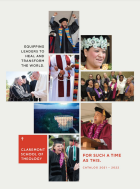PLEASE NOTE: APPLICATIONS FOR THIS CONCENTRATION ARE CURRENTLY CLOSED
Process thought is philosophical system that describes the world in fundamentally relational terms. According to process thought, every credit of reality is in ongoing process of change, and everything that occurs is confluence of one’s inherited past, contextual possibilities, and individual agency. This graduate program explores wide range of methods, themes, and applications of process thought, with special attention to Alfred North Whitehead’s “philosophy of organism.” Whitehead’s contributions are assessed in context of other philosophies of process thought of which dozens have been identified in Western philosophies and in the non-Western philosophical traditions.
The multiple applications of process thought to religious life and reflection are cumulatively known as process theology. Process theology seeks to integrate and reconcile the diverse facets of human experience (e.g., ethical, aesthetic, and scientific intuitions) into a relational understanding of the universe, without excluding the religious or spiritual dimensions of human existence. This relational worldview has significant implications for the fields of constructive theology, philosophy, ecology, economics, physics, biology, education, psychology, feminism, and cultural studies. Indeed, the ecological dimensions are significant enough that some are referring to recent work in process thought as “eco-process studies in culture and religion.” The purpose of the program in Process Studies is to train future leaders in process-relational approaches to study of ecology, culture, and religion today. Process Studies combines a variety of newly emergent fields and integrative methods to address key areas of debate that arise at the intersection of religion, culture, and nature. The program aims to provide academic leaders, religious leaders, and leaders in society with tools necessary for understanding interconnections between ecology, culture, and religion in this postmodern and pluralistic world. They will be trained in emerging theoretical perspectives that help to re-conceive and overcome fundamental dichotomies and binaries in contemporary culture. Using the techniques of postmodern/poststructuralist scholarship in particular, students will learn to formulate a truly pluralistic and differentiated worldview, one that is appropriate to our contemporary society and able to contribute to transformational change.
The Process Studies concentration draws on and seeks to integrate the whole range of contemporary studies in culture and religion, including their theological, philosophical, cultural, environmental, and interreligious dimensions. It aims to train students in the integrative shift that has been initiated by process theology, to enable them to work for a creative transformation of our world in the context of the most pressing concerns of our day. The diverse fields of interaction will include philosophies in Western and non-Western traditions, theologies, and philosophies of religion in diverse traditions, comparative religious studies, process studies and process theology, gender studies, feminist theory and feminist theologies, cultural studies (critical theories and liberation theologies), ecological studies (philosophies, theologies, and spiritualities), and the various fields of religion and science. The Process Studies concentration seeks to educate students not with a narrow specialization, but with the ability to understand the inherent connectivity of process thought and to apply process insights within broad arenas of human experience and scholarship. But it is possible to obtain such interrelations and applications only when students develop an equally broad range of competencies. There is an expectation of some knowledge of methods and theories in the following five areas: Process Philosophy, Philosophy of Religion/Philosophy of Science, Constructive Theology, Postmodern/Poststructuralist Studies, and Comparative Religious Studies. Students will deepen their knowledge in these five areas through coursework, outside studies (e.g., reading, papers, classes, or book reviews), Service-Learning activities, interreligious requirement, and preparation for their qualifying examinations.
Want to learn more?
Reach out to the Admissions Counselor for this program, Elizabeth Strowbridge, by emailing estrowbridge@cst.edu or by using the below link to submit an inquiry form.



